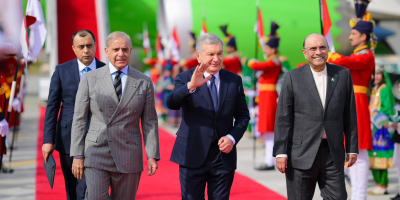Pakistan rejects Indian objection at CPEC

ISLAMABAD, June 02 (DNA): Pakistan on Tuesday rejected Indian criticism over the China-Pakistan Economic Corridor (CPEC) and said the multi-billion project will benefit the whole region.
Indian External Affairs Minister Sushma Swaraj said on May 31 that Indian Prime Minister Narendra Modi “very strongly” raised the issue regarding China-Pakistan Economic Corridor (CPEC) during his recent visit to Beijing, and termed the project “unacceptable”.
Pakistan’s top Foreign Affairs Adviser, Sartaj Aziz, while responding to the Indian concern over CPEC said he was rather surprised by the Indian External Affairs Minister’s remarks that it is ‘not acceptable’.
“The mega project is all about regional connectivity and economic development and prosperity of the common people of the entire region. There is dichotomy in the Indian statements on their pronouncements on the importance of the regional connectivity for development and their negative comments about CPEC,” Mr Aziz said in a statement.
The Adviser added that it should be clear that Pakistan and China enjoy exemplary relations.
“Pakistan maintains a policy of non-interference in other countries’ bilateral relations and expects the same from others to refrain from commenting on Pakistan’s bilateral relations with other countries,” he said.
The Pakistani adviser also referred to the recent remarks by the Spokesperson of the Chinese Foreign Ministry who has said, “China-Pakistan Economic Corridor is a major Cooperation Framework between the two countries and is not against any third party.”
The Pakistani Adviser said that ‘the Prime Minister’s vision envisages improved relations with all its neighbours including India.
“It was in this spirit that the Prime Minister attended the oath taking ceremony of Prime Minister Modi in New Delhi on 26 May 2014. The primary objective of this vision is economic development of the region,” Mr Aziz recalled.
As regards to the trial of the suspects in Mumbai attacks case, the Pakistani adviser said the case is proceeding in the Court of Law.
“The Indian concern over slow progress calls into question its own reluctance to cooperate by not allowing the Judicial Commission’s visit to India until September 2013,” Mr Aziz said.
“Pakistan has its concerns too. Information on the trial of Indian Military’s active service officers named by the RSS member Swami Aseemanand, who was the mastermind, has not been shared,” the Pakistani adviser said.
He also recalled that scores of Pakistanis lost lives in the terrorist incident at the 2007 “Samjhota” train on the Indian side of the border that had killed nearly 70 people, mostly Pakistanis.
“Samjhota happened two years earlier than Mumbai attacks. The victims’ families are still waiting for delivery of justice,” the Pakistani adviser said.
He said Pakistan’s policy all along has been that all outstanding disputes, particularly the dispute of Jammu and Kashmir should be resolved through dialogue. Pakistan has conveyed to India that it remains committed to dialogue, provided India is ready.
“Pakistan also believes that the people of Jammu and Kashmir are important stakeholders in the final resolution of the Kashmir dispute since they have yet to exercise their right to self-determination as enshrined in numerous UN Resolutions.”
Referring to the “principle” of creating an atmosphere of harmony, free of terror and violence, the Adviser said that peace is multi-dimensional process.
When India keeps violating ceasefire at the Line of Control and the Working Boundary, indulges in worst human rights violations against helpless Kashmiris in Indian occupied Kashmir, and undertakes subversive activities in Pakistan, then asking Pakistan to create an environment free of violence only sounds ironical.
In this context, the Adviser referred to the recent articulation of Indian policy by Defence Minister Manohar Parrikar, which confirmed Pakistan’s apprehensions regarding Indian involvement in terrorism in Pakistan.
“Pakistan is most affected by terrorism and has sacrificed thousands of lives in its counter-terrorism efforts. Terrorism is thus a common challenge, and fighting this menace requires collective efforts.” DNA
Related News

Uzbek President Mirziyoyev in Islamabad for a two-day state visit
Asnar M Bhatti ISLAMABAD, President of the Republic of Uzbekistan Shavkat Mirziyoyev on Thursday arrivedRead More

British High Commission celebrates Scottish-Pakistani ties at ‘Caledonian Ball’ in Lahore
ISLAMABAD, FEB 5 /DNA/: Held at the historic Sir Ganga Ram Residence, Wednesday’s Caledonian BallRead More


Comments are Closed